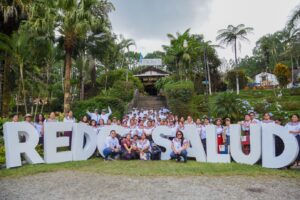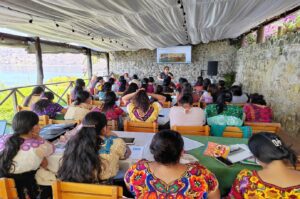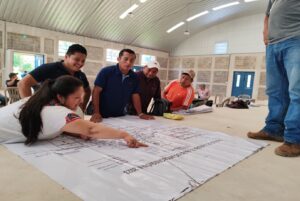About CEGSS
The Centro de Estudios para la Equidad y Gobernanza de los Sistemas de Salud (Center for the Study of Equity and Governance in Health Systems, CEGSS) is a CSO that was founded in 2009. Working in five departments of Guatemala, its objective is to promote social inclusion, democratic governance, and the equitable access of the indigenous rural population to public health services.
CEGSS focuses on action research and innovation in legal empowerment and citizen monitoring for accountability. It works closely with a network of health rights defenders (REDC-Salud) that it established and supports. REDC-Salud has carried out sustained monitoring of health service delivery since 2013.

Learn more about the work of CEGSS and REDC-Salud from this short video of the 2025 Assembly of the Defenders of the Right to Health.
CEGSS has seven areas of work: communication, including of public health messages; accompaniment of rural people engaging with services; monitoring access to services; participatory research to generate locally-led solutions; promoting spaces for dialogue and negotiation with health service stakeholders; learning and systematizing knowledge; and citizen training.
ARC and CEGSS have worked closely together since 2016. Walter Flores, founder of CEGSS, was its director until early 2020. In 2023, he became a member of ARC’s core team at American University. He advises current CEGSS directors and staff, as well as collaborating in several research projects.
Areas of collaboration
Co-creating municipal public policies for health and wellbeing
The national government elected in November 2023 made strong headline policy commitments to transparency, participation, and accountability. But implementation has been hampered by entrenched bureaucracy and political shifts.
Against this backdrop, CEGSS is engaged with CSOs, service users, and municipal government in 31 municipalities. They are working together for three years (2024-2027) to co-create municipal health services that are more responsive to the health needs of indigenous populations.
This area of work includes a three-year program of scholarships for five young rights defenders each year. This is strengthening the capacity of community researchers and uses conceptual frameworks co-developed with ARC.
Strengthening the community health rights defenders network
ARC is supporting CEGSS to bolster its organizational capacities in order to expand and strengthen the REDC-Salud network.
This action learning process aims to make REDC-Salud’s work addressing social exclusion in health systems more visible and recognized nationally and internationally. The goal is that health system policymakers and service providers will become more responsive to the voices of indigenous rural citizens, especially concerning accessible services for women, children, and young people.

The Citizen Training School for the Right to Health in Sololá, focuses on strengthening capacities to defend the right to health. Watch a short film about the graduation of the school’s second cohort. Photo: CEGSS team.
Working towards inclusive climate change policies
The health of marginalized rural people is directly affected by climate change, but they are seldom included in policy discussions, or in monitoring and evaluation.
CEGSS and REDC-Salud, with ARC and York University (Canada), are developing a participatory process in rural indigenous communities to map climate-related risk and track the response of public institutions to emergencies and disasters. Once bottlenecks are identified and community demands prioritized, CEGSS and REDC-Salud will undertake multilevel advocacy for inclusive climate change policies and programs.
Exploring the nexus between maternal health, mental health, and climate change
Acute vulnerability to the threats of climate change increases pressure on mental and maternal health in already marginalized rural indigenous communities. This collaborative action research (CEGSS, REDC-Salud, ARC, York University) seeks to understand how community members conceive of mental health needs in relation to maternal health, and document their coping strategies.
The purpose of the research is to co-create advocacy strategies to support and strengthen the provision of culturally appropriate maternal and mental health care in these communities.

REDC-SALUD advocates from Zona Reyna, Uspantán, Quiché map how their communities are affected by changes in climate, identifying danger and safety zones to strengthen their emergency plans. Photo: CEGSS
Resources
Visit the CEGSS website or follow them on Facebook to find out more about all their activities and knowledge products.
Communication and Learning Strategies of Health Rights Advocates in Guatemala, Mexico, and the Philippines (Learning Exchange Report, Julia Fischer-Mackey et al., 2025) (also in Spanish)
Exploring the Interconnections between Health, Climate Crisis, Food Insecurity, and Institutional Neglect in Alta Verapaz Region, Guatemala (Journal article, Esteban Sabbatasso et al. 2025)
Ten Dimensions of Network Strengthening: Lessons from Health Rights Advocates in Guatemala, Mexico, and the Philippines (Julia Fischer-Mackey et al. 2025) (also in Spanish)
Indigenous-Led Struggles for Health Justice in the Context of the Climate Emergency: Insights from Guatemala (Journal article, Jeannie Samuel, Benilda Batzin, Rosaura Medina, Evaristo Caal, Karin Slowing, Esteban Sabbatasso.and Walter Flores, 2024)
‘History Obligates Us To Do It’: Political Capabilities of Indigenous Grassroots Leaders of Health Accountability Initiatives in Rural Guatemala (Journal article, Alison Hernandez, Anna-Karin Hurtig, Miguel San Sebastian, Fernando Jerez, and Walter Flores, 2022)
Defensor/a: A Term to Refer to Indigenous Health Rights Defenders in Guatemala (ARC Accountability Keywords blog, Benilda Batzin, 2021) (Spanish version)
Building Partnerships Based on Trust: Q&A with ARC and CEGSS (Hewlett Foundation blog, Pat Scheid, 2021)
Rural Public Health Systems and Accountability Politics: Insights from Grassroots Health Rights Defenders in Guatemala (Journal article, Julia Fischer-Mackey, Benilda Batzin, Paulina Culum & Jonathan Fox, 2020)
Defending the Right to Health in Guatemala (ARC Accountability Note, Benilda Batzin, Paulina Culum, and Julia Fischer-Mackey 2020) (Spanish version)
Building Collective Power in Citizen-led Initiatives for Health Accountability in Guatemala: The Role of Networks (Journal article, Alison Hernandez, Anna-Karin Hurtig, Isabel Goicolea, Miguel San Sebastian, Fernando Jerez, and Walter Flores, 2020)
How Can Evidence Bolster Citizen Action? Learning and Adapting for Accountable Public Health in Guatemala (ARC Accountability Note, Walter Flores, 2018) (Spanish version)
